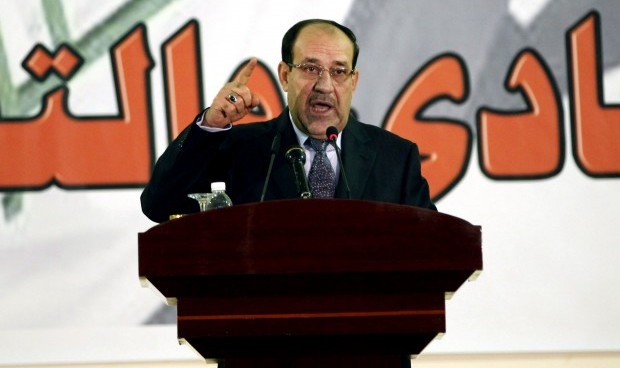When, a few months ago, I stated that the Iraqi government’s involvement in Syria was serving the Iranian regime, I did so without sufficient evidence. I made these comments based on accounts, and Iraqi-Iranian activities in Egypt, Lebanon, Gaza, and Syria. Today, the picture is much clearer, and there is plenty of evidence. Nuri Al-Maliki’s government is indeed playing a major role in supporting Iranian plans, including complete financial funding and military involvement in oppressing the Syrian people.
Maliki, who is supposed to be the prime minister of a coalition government—since his Islamic Da’wa Party did not have enough seats to form a government on its own—has gradually turned into a complete dictator with complete authority. Similar to the president of North Korea, Maliki is both prime minister and minister of defense. He is now also Minister of Finance, after accusing Rafie Al-Issawi of being a terrorist.
From the beginning, he held the powers of Iraq’s security and intelligence apparatus in his hands. What is most strange is that he is also head of the central bank. His appetite for power is unparalleled in the context of an electoral democracy, in which he is already a failure, after receiving less votes than his rival, Dr. Iyad Allawi. Today, he is acting as a dictator, and, worse than this, is serving the Iranian regime.
Iran is economically under siege as a result of its nuclear program; it can only sell a small part of its oil, and cannot trade with many countries around the world. It cannot even transfer dollars because of the US sanctions. Maliki is now providing his services free of charge, spending billions of dollars of Iraq’s money on Iranian political projects. Iranian bills are being sent to Maliki to finance Hezbollah and Hamas, and he has also offered USD 3 billion to Egyptian President Mohamed Mursi without interest, while Qatar—whose support of Mursi is viewed with suspicion—offered a similar sum but with a high rate of interest.
Maliki made a generous deal with Moscow to buy arms and finance Assad’s regime with what its needs, providing funds and ammunition. Maliki also sponsors Syria’s external expenditure, and has been supplying fuel to the country for the past two years. This is why the regime’s military vehicles are still functional, even though the Syrian refineries have stopped working.
Maliki has succeeded in lifting the economic blockade on Iran, enabling it to continue with its international military adventures. He also succeeded in squandering the money of the Iraqi people—who are still one of the poorest populations in the Arab world—while Maliki’s own personal wealth is unlike anything the country has witnessed in the last century. When the Americans withdrew from Iraq, they handed him USD 70 billion of their remaining funds. Meanwhile, he sells even more oil than Kuwait.
The problem is not just deprivation and poverty. It is also to do with the general state of instability that he is responsible for. The Iraqi people have already suffered from eight years of war against Iran under Saddam Hussein; a 12-year conflict against Kuwait; and then, after Saddam’s removal, seven years of fighting terrorism. It is as if the years of bloodshed and chaos have not taught Maliki anything. He has not granted the Iraqis any security, peace, or development. Rather, he has sparked personal conflict with Sunni leaders who had previously been allied to him, such as Saleh Al-Mutlaq, Tareq Al-Hashimi and Rafie Al-Issawi. This is not to mention other Shi’ite like Moqtada Al-Sadr, and his Kurdish allies who helped him become president.
Now, Maliki has launched a new battle to support the failing Syrian regime. Last week, the world was surprised to see Maliki deploying 20,000 soldiers to the border region with Syria under the pretext of “fighting A-Qaeda.” Of course, there is no Al-Qaeda, rather this is a code-word for the Syrian rebels. We are now set to see the “liberation” of villages that had fallen out of the Assad regime’s hands, in an attempt to re-open the border crossings which are now being held by the Syrian rebels, potentially sparking a new war!
With Hezbollah collaboration, Maliki is now fighting alongside Assad’s forces,and following Iranian orders. Iran had already stated that it won’t allow the regime in Damascus to fall, whatever the cost—whether it’s Lebanese and Iraqi lives, or the Iraqi people’s money.

whoever said this is no longer a sectarian conflict is wrong. The shia bloc in ME is now united against sunnis in massacring hundreds of thousands of sunni muslims. The sunnis are just waking up to the fact and there is fear they will over react and what we may see is a violent end of Assad, Hizbolla and Iranian regime including stooges like Maliki from Iraq.